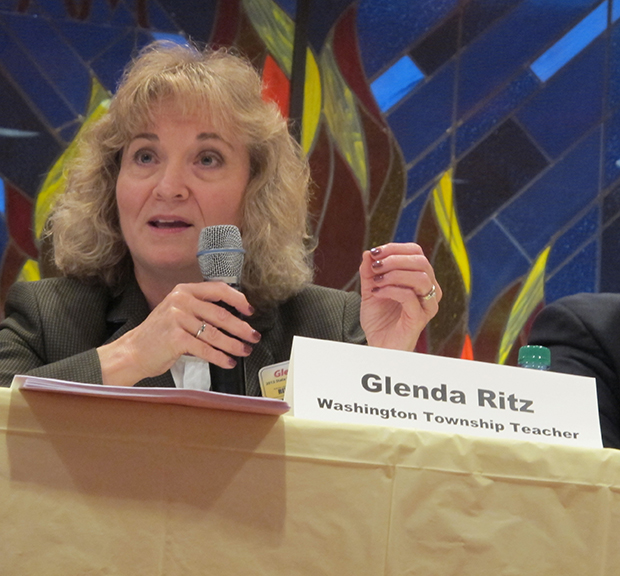Tensions Remain High As State Board Sets Timeline For A-F Letter Grade Release

Elle Moxley / StateImpact Indiana
Gordon Hendry, left, Brad Oliver and state superintendent Glenda Ritz listen to a presentation at the November State Board of Education meeting.
Indiana schools will get their A-F letter grades Nov. 15, but state education officials won’t make those results public until after an appeals window closes in December.
That’s a change from the initially proposed timeline, which had the State Board of Education meeting in special session later this month to approve 2012-13 school letter grades. But board members objected to a public release of those scores before schools had a chance to appeal.
“There’s a policy concern, says Michelle McKeown, general counsel for the Center for Education and Career Innovation, the agency that represents the State Board. “We know from the last several years we catch errors through the appeals process.”
But against the backdrop of an ongoing battle between state superintendent Glenda Ritz and the other members of the State Board of Education, an attorney representing the Indiana Department of Education argued that statue required the board assign A-F grades before schools could make an appeal.
“It seems as if our debate is about the board’s role and when it should start,” said Ritz as the two lawyers stood at the podium, interrupting each other with their interpretation of the law.
Today’s meeting is the first since Ritz sued the other 10 members of the State Board last month, accusing them of violating Indiana’s Open Door law when they sent a letter to Republican leaders asking for help calculating A-F grades.
Board member Brad Oliver expressed frustration with what he sees as the public perception that the board is in such a rush to release letter grades that they don’t care what happens to schools.
“The department released data to the schools in such a way that they could calculate their own preliminary grade,” said Oliver. “Which raises the question, why not give them the preliminary grade?”The timeline the board ultimately agreed to has those scores going to schools Nov. 15. The CECI counsel, McKeown, says on average, about 30 to 50 schools appeal their score each year and ultimately receive a different rating from the state.
But getting those appeals processed before the scheduled Dec. 4 meeting would be “humanly impossible,” McKeown told board members. She recommended a late December meeting to finalize school letter grades.
“Are you saying the board will approve A-F grades in 2013?” asked Gordon Hendry.
“Yes,” replied Ritz.
Three State Board members — Dan Elsener, Andrea Neal and Troy Albert — were not at Friday’s meeting and did not vote. Elsener is attending an out-of-state funeral; Neal had planned a special activity with her students; and Albert arrived mid-meeting due to a prior commitment.
This post may be updated.



